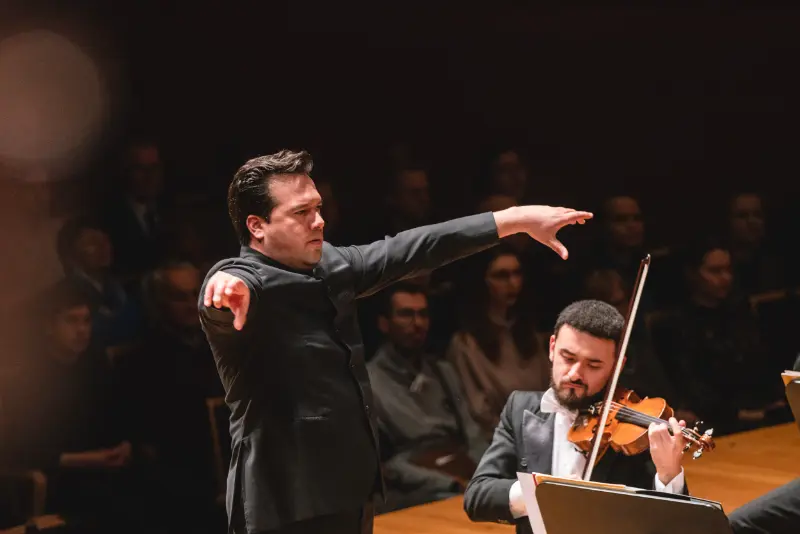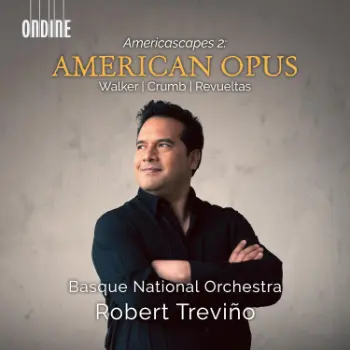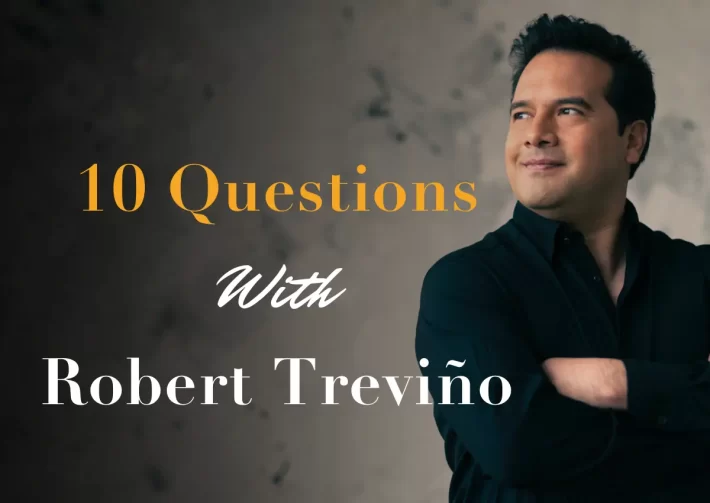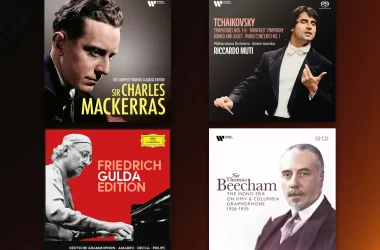Conductor Robert Treviño answers The Classic Review’s 10 questions.
Where will he most likely find inspiration? How many hours does he study scores each day? And what is the one classical music album he couldn’t live without?
What new repertoire are you currently working on?
Currently, the newest work I’m preparing is John Adams’ Harmonium. It has been a work that I’ve wanted to do for many, many years. I’ll be presenting it in an All-American Program in Orchestre Philharmonique de Radio France, in Paris this month. John Adams’ music is extraordinary to me, world-class. He is one of the great composers of all time, and I’ve had the amazing privilege to work with him and have a wonderful contact with him.
What’s a piece of music you don’t currently conduct but wish you could?
Perhaps top of my list is Bach’s B-Minor Mass. I was supposed to conduct it while in conservatory, but it proved too hard for me and my classmates at the time. I’m hoping one day soon to program it with a nice small/medium-sized group who are super dedicated to it. I’ve been preparing it for the better part of 20 years now.
Are there any classical composers whose music you don’t quite connect with?
So this question has one facet that is very particular to me. Of course, I have my preferences and some works, and composers, who don’t speak to me. That being said, I’ve always taken the approach: if I don’t like it, or it doesn’t speak to me, then it’s probably my problem and I just need more knowledge or experience to find my conviction in the music. So for this very reason, I’ve been working on Carl Nielsen’s symphonies – for about seven years – but they aren’t ready yet. Same for Martinů’s symphonies. But I keep at it and continue to try to find my conviction with these works.
What was the latest contemporary music piece that impressed you?
There are many composers who are making amazing new works. I have my own tastes, of course. For example, I just commissioned a new Piano Concerto by the Basque composer Ramón Lazkano. I was really impressed with the piece and am proud to have been part of the commissioning of it (YouYube).
Also, Kareem Roustom’s Strange Sea, another work I commissioned with the Malmö Symphony Orchestra, which I will conduct again in Japan later this month. I also am a supporter of Zhou Tian, whose music I perform often, like his Concerto for Orchestra, which I brought to Europe for its premiere.
How much time do you dedicate to study scores each day? What are your best tips for developing effective learning habits?
Nowadays, with my schedule, I can’t dedicate a fixed time daily. Some days I’m in meetings from morning to night, and others in auditions for my orchestra, or on a trans-Atlantic flight, or simply spending some time with my wife and son. At home, my wife and I study often (we are both musicians), and what we see in our home is that dedication and application to learn constantly has inspired our son to love to learn, and to have love for education and the discipline it requires.
My habit until I was about 32 was to study anywhere from 4-6 hours a day. Now, with rehearsals and many other music and managerial activities, I don’t have that time. What I do have is the ability to plan two to three years in advance. So if a work is new, I usually start preparing it four or five years ahead. That’s also because I want to know the text as best as possible. I have also learned to memorize my scores, so I can do micro-learning while, say, in a taxi, or having breakfast.

Robert Treviño (image: Karol Sokolowski / NFM)
I would advise any young conductor to spend as much time as is humanly possible on studying everything – to be curious! I read a lot, including philosophy and biographies, I go to museums, go to concerts, I’m constantly trying to educate myself. I should also say that the amount of time needed to study, in a way, is smaller now because my experience has become bigger. I’ve been a musician for 27 years now, and conducting for 24 years of that, so my learning is rooted in a pre-existing base of knowledge.
How do you find inspiration when performing?
Easy, I love my work, my craft, my art, my life. I’m deeply passionate about what I do, and inspiration is constantly flowing because I’m in awe of music. If I start to speak with a younger musician about Brahms’ Violin Sonata No. 1, my heart rate goes up, and I can talk non-stop with excitement. However, my wonderful teacher, David McGill, told me once that a musician should never rely on inspiration to do their ‘job’; That to do the work properly we must respect the text of the composer and understand its requirements, to make sure whatever technique is required to render this text consistently.
“Inspiration is constantly flowing because I’m in awe of music.”
Do you experience performance anxiety? If so, how do you manage it?
No, I don’t generally feel performance anxiety. That’s because the vast majority of the conductor’s work is before and then at rehearsal – the concert is where one hopefully can fly! However, I can feel nerves right at the first rehearsal because I don’t always know how the orchestra will be or even sound! Imagine telling a violinist to practice a work at home on one violin, and then they go on stage and are given an entirely different instrument. This is, in a way, what happens as a conductor – the orchestra is our instrument, and it’s different from day to day and place to place.
If music wasn’t your passion, what other career path might you have chosen?
I would consider having a business of some sort, or maybe being a lawyer.
What advice do you have for young musicians starting their careers?
The road to being a professional musician is near-impossibly difficult. That is, being a musician who can provide for their lives on a consistent basis, so if you can imagine happiness in anything else you should do that. This profession demands enormous sacrifice, that is life-long, it’s almost not compatible with family, and if you’re a conductor you travel so much it’s hard to maintain deep friendships like normal people.
Be curious, seek answers, and keep seeking them because life’s questions often remain the same, while their answers change with time and age.
What classical music album(s) you couldn’t live without?
Glenn Gould’s second, digital recording of Bach’s Goldberg Variations.
* * *
Robert Treviño’s new album, “American Opus” is out now on Ondine. A follow-up to the award-winning ‘Americascapes’, it includes three little-known major American works – George Walker’s Address For Orchestra, George Crumb’s A Haunted Landscape, and Silvestre Revueltas’s La Coronela.
Visit Robert Treviño’s website, and his feeds on Facebook, Instagram, and X.

See offers for this album on Amazon.
Top image Robert Treviño: ©️ Tommy Ga-Ken Wan
Included with an Apple Music subscription:
Latest Classical Music Posts
Join The Classical Newsletter
Get weekly updates from The Classic Review delivered straight to your inbox.

















